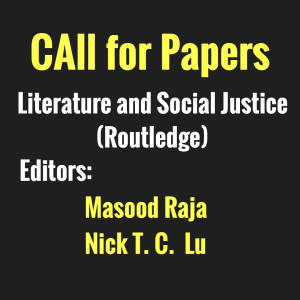 Guidelines for Contributors to Routledge Companion to Literature and Social Justice
Guidelines for Contributors to Routledge Companion to Literature and Social Justice
Editors: Masood Ashraf Raja (mraja@unt.edu) and Nick T. C. Lu (nick.lu@selu.edu)
Project Description:
Our proposed Companion (now under contract) will contain 40 to 45 original essays written by internationally recognized scholars and a few exciting new voices in the field. In selecting our contributors, we give preferences to researchers whose recent publications exemplify some of the most cutting-edge and potentially trendsetting approaches to the intersection between social justice and literature. Our goal is to put together a comprehensive book that paints a plausible picture of where the field is heading in the next 5 to 10 years, while showing the ways in which a range of currently pressing issues are analyzed and treated by scholars known for their imaginative and innovative application of the critical traditions of feminism, critical race theory, Marxism, ecocriticism, queer, indigenous, and disabilities studies. In incorporating these diverse approaches, we hope to provide our readers a highly usable book that is easy to reference for varying research and pedagogical purposes. To better achieve this end, we will further organize the chapters by their different themes and uses. Our companion will begin with an introductory section that offers historical overviews of major developments and debates in the above critical traditions. The following sections will then dive deeper into each of these traditions and guide readers to see how they are applied as analytical tools to real-world inequalities and the results to be gained in doing so. In all of the thematic sections, there will be one pedagogical essay (e.g., “Teaching Racial Justice”), one praxis essay (e.g., “Racial Justice in Action”), followed by two to three case studies of literary texts, or social movements, or the combination of the two. We envision our companion to be the one versatile book on the market which allows researchers, educators, and students alike to find in one place the most up-to-date information that covers both representative and emerging texts and case studies globally.
Table of Contents:
Our companion will have 40 to 45 chapters. The chapters will be divided into 10 topics: “Theoretical Overviews,” “Distributive Justice,” “Civil Rights and Political Justice,” “Racial Justice,” “Sexual and Gender Equality,” “Environmental Justice,” “North-South Justice,” “Indigenous Justice,” “Disability Justice,” and “Liberation Theology.” An essay-length introduction will be prepared by the co-editors to summarize the chapters and guide readers to use the companion. We understand that the overriding aim of a companion is to be representative and current at the same time; therefore, each section after “Theoretical Overviews” will consist of an essay on pedagogy, an essay on praxis, and at least two case studies analyzing both well-known and emerging contemporary texts/topics.
- Following is a list of chapters we still need contributors for.
- Words in parentheses are intended as suggestions only, not binding directives.
I. Theoretical Overview
- Social Justice as a Philosophical and Affective Category.
- Queer Theory.
- Critical Race Theory.
- Indigenous and Decolonial Theory.
- Disability Theory.
- Liberation Theology.
II. Literature of Anti-Imperialism and Postcolonialism
- Literary Case Study (emerging literature).
- Pedagogy Chapter: Teaching Anti-Imperialism.
- Praxis Chapter: Anti-Imperialism in Action (with reference to protests against World Bank, the G7, inequity in access to COVID-19 vaccines, etc.).
III. Literature of Class Struggle, Workers’ Strikes, and Distributive Justice
- Literary Case Study (representative literature).
- Pedagogy Chapter: Teaching Distributive Justice.
- Praxis Chapter: Distributive Justice in Action (with reference to recent strikes).
IV. Literature of Democratic Movements and Civil Rights
- Literary Case Study (literature of representative movements: Civil Rights movements, Tiananmen Square, the Holocaust, etc.).
- Pedagogy Chapter: Teaching Civil Rights and Civil Participation.
- Praxis Chapter: Civil Rights in Action (with reference to recent democratic movements).
V. Literature of Racial Justice
- Literary Case Study (contemporary representative literature, Afro-futurism, etc.).
- Praxis Chapter: Racial Justice in Action (with reference to recent protests such as BLM).
VI. Literature for Gender Equality
- Literary Case Study (emerging feminist topics from various regions).
- Literary Case Study (the latest of queer study).
- Pedagogy Chapter: Teaching Gender Equality.
VII. Literature of Environmental Justice
- Pedagogy Chapter: Teaching Environmental Justice.
- Praxis Chapter: Environmental Justice in Action (with reference to recent movements).
VIII. Literature of Decoloniality and Settler Colonialism
- Literary Case Study (latest topics concerning indigenous rights and equality).
- Pedagogy Chapter: Teaching Indigenous Justice.
IX. Literature of Liberation Theology and Social Change
- Literary Case Study (representative literature of world regions).
- Literary Case Study (post-secularist perspectives).
- Pedagogy Chapter: Teaching Liberation Theology.
- Praxis Chapter: Liberation Theology in Action (with reference to recent movements).
X. Literature and Disability Justice
- Literary Case Study (representative literature of world regions)
- Literary Case Study (latest perspectives on literature of disability studies).
General Guidelines for All Contributors:
In principle:
- Adopt a systematic approach to connect the central issue under discussion in your chapter with other related issues (e.g., a chapter on indigenous rights may branch out to economic and ecological justices).
- Contextualize analysis of specific social justice issues against the history of capitalist modernity especially in its still ongoing neoliberal phase.
- Use only author-owned or public-domain illustrations and/or graphics.
- Prepare the manuscript according to The Chicago Manual of Style 17th
- Use endnotes.
- Prepare the manuscript in no more than 6500-7000 words including abstract, citation, endnotes.
Guidelines for Contributors to Theoretical Overviews:
Our first section “Theoretical Overviews” is intended to provide the readers with the historical knowledge of each social justice subfield and, in so doing, add historical depths to the case studies and essays in the following sections. We ask our contributors in this section to please offer comprehensive and detailed discussions of major debates, important movements, theoretical breakthroughs, and latest developments of each of their subfields.
Guidelines for Contributors to Pedagogical Essays:
Our pedagogical essays seek to offer educators and students actionable methods to connect their teaching and reading of literature to day-to-day social justice awareness, debates, and activism. We ask our contributors to provide specific and actionable examples and, if applicable, quantifiable data of innovative classroom pedagogy to aid the overall purpose.
Guidelines for Contributors to Praxis Essays:
In principle, the praxis essays (i.e., essays on real-world social movements and their useful and teachable strategies) should focus on recent or ongoing movements in world regions. However, in order for such discussions to remain relevant for a longer period of time. We request that our contributors take a longue-durée perspective in their analyses of present movements; historicize current movements in relation to past action; and establish their significance for future action. As an example: Milk Tea Alliance’s relation to protests in Hong Kong, and it’s broader meaning for democratic movements in the South-East Asia as a whole.
Guidelines for Contributors to Literary and/or Historical Case Studies:
We ask our contributors to select well-known or lesser-known contemporary texts/events that can illuminate the central concerns of specific world regions or groups of people. In short, please consider the representativeness in your selection of primary texts and/or events.
Projected Timetable:
100–200-word formal abstract or informal plan for chapter via email: 1 month after letter of interest.
Chapter draft: October 31, 2022.




A good scholarly attempt!
Sounds like a fabulous project!. Would live to present Bangladeshi authors and critics.